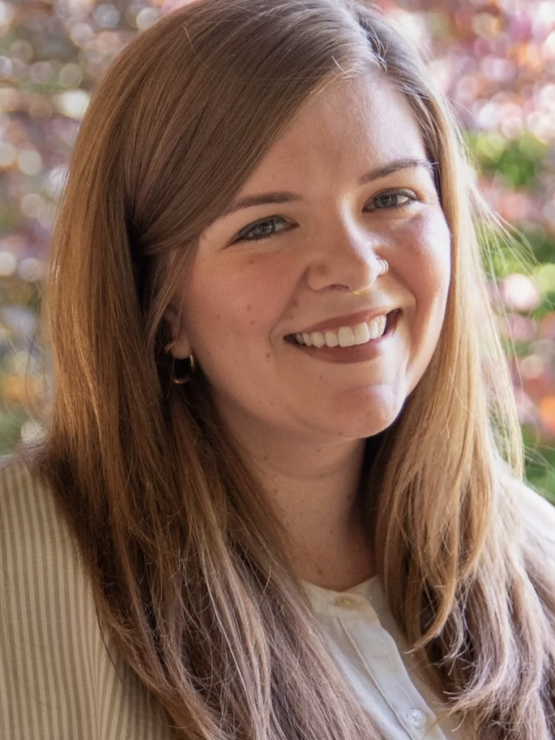
Designing a Just Society
Professor Katy Morgan's pioneering community design program empowers students to transform the places they live by conceptualizing stronger and more resilient neighborhoods.
Explore the research programs run by our Psychology faculty and discover how our students conduct and present scientific research of their own.

Designing a Just Society
Professor Katy Morgan's pioneering community design program empowers students to transform the places they live by conceptualizing stronger and more resilient neighborhoods.
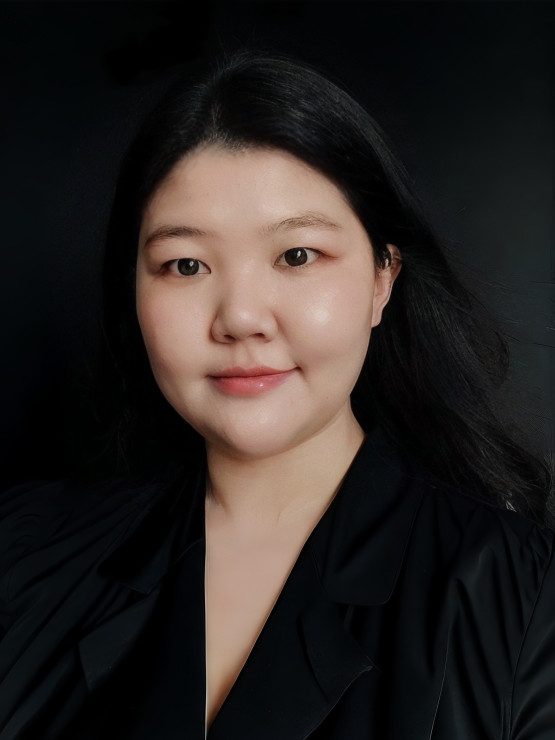
Using Narratives to Facilitate Intergroup Understanding
Professor Teri Terigele was awarded the 2025 Kennedy Endowed Faculty Fellowship to support her scholarly work, including student-involved research projects while teaching her study-abroad course in Hirikata, Japan.

Bridging Scholarly Communities
Professor Chris Silver has been named a Visiting Senior Research Fellow in the Faculty of Social and Life Sciences at Wrexham University. He will be giving a keynote address at the university in August 2025.
Sewanee students conduct research alongside our Psychology faculty during the academic year and summer. These co-curricular opportunities build core competencies in undergraduate psychology education and career readiness, including analytic and scientific thinking, an understanding of rigorous and responsible conduct of research, communication skills, professionalism, and leadership. Many of our students have published their work in peer-reviewed journals and/or presented their work at scientific conferences.
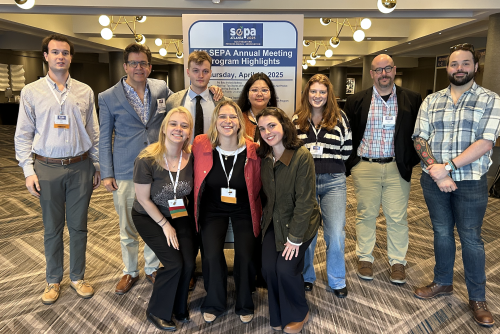
Five Sewanee faculty (Professors Bardi, Terigele, Morgan, Silver & Andrews) and more than 20 of their students presented their research projects the 2025 Southeastern Psychological Association (SEPA) Conference in Atlanta, GA
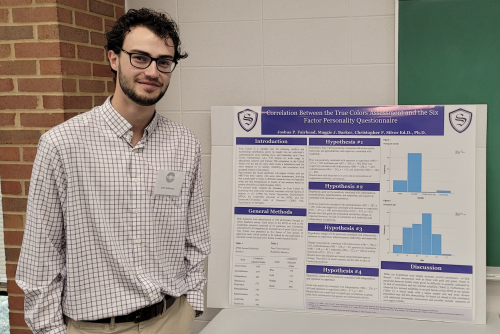
Josh Fairhead (C’25) presented his research project from Dr. Silver’s lab at the 2024 Mid-South Psychology Conference in Memphis, TN
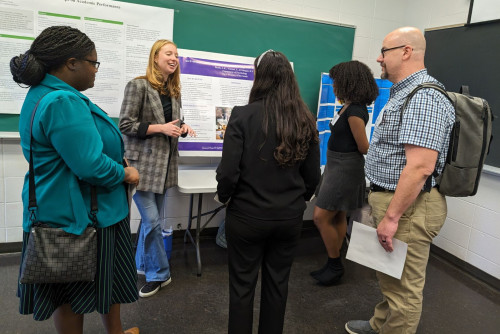
Lily Brady presented her research project from Dr. Morgan’s lab at the 2024 Mid-South Psychology Conference in Memphis, TN
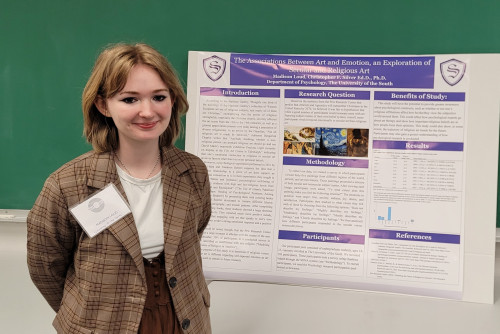
Maddy Loud presented her research project from Dr. Silver’s lab at the 2024 Mid-South Psychology Conference in Memphis, TN
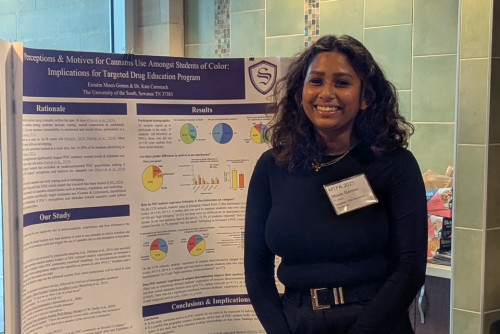
Moon Gomes (C’24) presented her research project from Dr. Cammack’s lab at the 2025 Middle TN Psychology Association Conference in Murfreesboro, TN
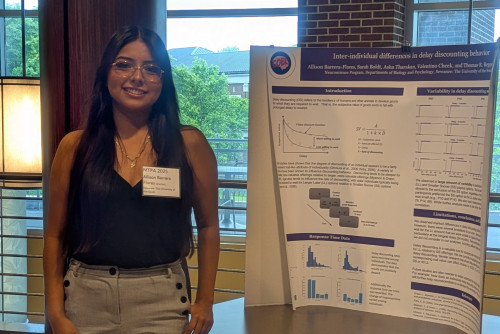
Allison Barrera Flores (C’26) presented her research project from Dr. Reppert’s lab at the 2025 Middle TN Psychology Association Conference in Murfreesboro, TN
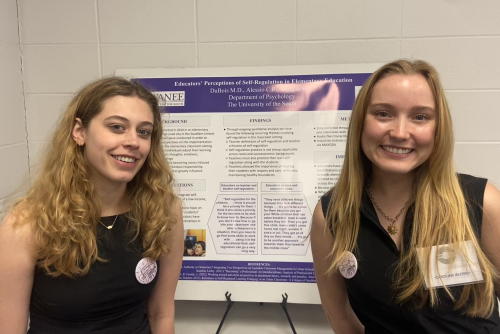
Maddy DuBois (C’24) and Caroline Alessio (C’24) presented their research project from Dr. Morgan’s lab at the 2024 Mid South Psychology Conference in Memphis, TN
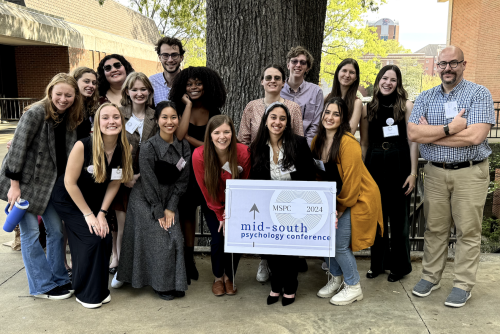
Professor Morgan, Professor Silver, and 14 of their students presented their research projects at the 2024 Mid South Psychology Conference in Memphis, TN
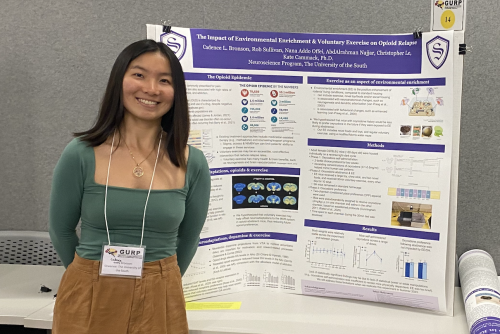
Cadence Bronson (C’23) presented her research project from Dr. Cammack’s lab at the 2023 Georgia Undergraduate Research in Psychology Conference in Kennesaw, GA
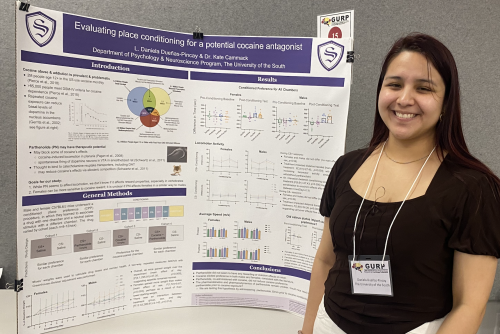
Daniela Dueñas-Pincay (C’23) presented her research project from Dr. Cammack’s lab at the 2023 Georgia Undergraduate Research in Psychology Conference in Kennesaw, GA
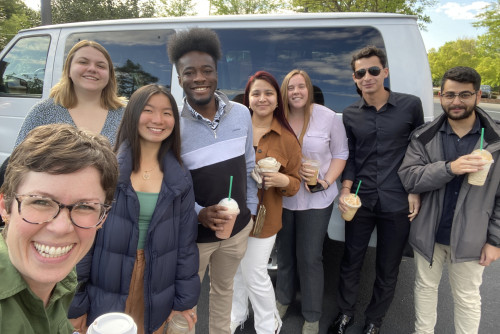
Professor Cammack and six of her students presented their research projects at the 2023 Georgia Undergraduate Research in Psychology Conference in Kennesaw, GA
Gaining research experience as an undergraduate can be invaluable to your professional (and personal!) growth. Research opportunities are a great chance to extend your coursework, gain hands-on experience in a lab, develop skills for your career, or explore potential directions to take your postgraduate studies.
Most of our faculty members conduct research during the academic year and over the summer. If you’ve enjoyed a professor’s course or know a bit about their research, you might ask them about joining a current or upcoming project. You can also explore our faculty’s bios & research interests, consult your academic advisor, contact the Director of Undergraduate Research & Scholarship, chat with your classmates, examine the conference posters hanging in our hallways, or visit with students presenting their research at Scholarship Sewanee. We’re excited to work with you!
Sewanee’s Office of Undergraduate Research & Scholarship offers funding and support for a wide variety of research experiences and internships, including a dynamic SURF program, an annual campus-wide research symposium, and support to travel to and present at academic conferences. Our department also sends many students to regional and national conferences to share their research as posters or oral presentations.
Sewanee also sponsors a select number of students interested in psychology, neuroscience, biology and/or chemistry for an 8-week summer internship at the Yale Child Study Center. In the past, some students have been able to continue these summer research projects back on our campus, with Sewanee faculty co-sponsorship. See our Sewanee-at-Yale website to learn more.
Dr. Terigele is interested in exploring how people interact with individuals from different social groups in both direct and digital settings. Her research aims to understand why we differentiate between “us” and “them,” how social identities shape and change our perceptions even before we interact, and the real impact of DEIB efforts on underrepresented employees. Her projects also examine how media narratives influence intergroup attitudes and whether generative AI could surpass human efforts in fostering a more inclusive world.
Dr. Fisher’s primary area of research is focused on gender similarities and differences regarding sexual behaviors and attitudes. She also does studies on ways to enhance honesty when reporting sensitive behavior. She has supervised Sewanee student research on sexual identity, sexual decision making, sexual assault, and sexual pain.
Professor Morgan’s research explores civic and sociopolitical identity development. Through her research, she seeks to understand how young people come to see themselves as change agents in their communities. She employs community-based participatory research methods, studying youth civic power within school-based interventions, within empowering community contexts, and across the lifespan.
Dr. Silver’s research is within two domains. The first domain is within attitudes toward diversity by high-status groups. In other words, exploring the attitudes of those in power and typically the numerical majority and how they perceive diversity initiatives influencing their perceived power and status. The second domain is in the field of psychology of religion with an emphasis on social cognition as it applies to religious identity, attitudes, and personality research. Dr. Silver’s research has explored personal images of Jesus in their mind and religious risk rituals such as the Serpent Handling Sects of Appalachia. Currently, Dr. Silver is working with an international team to explore how concepts of faith and meaning change over time.
Dr. Reppert investigates the relationship between motor control and perceptual decision making. He uses eye movement metrics to ask questions such as: Why do some people make consistently faster movements than others? Why do we often make more errors when we are pressed for time? His work focuses on how motivational state and attentional control shape behavior.
Dr. Yu’s current research focuses on judgment and decision making. In particular, she seeks to better understand the under-studied yet foundational aspect of decision making known as option generation: How do we determine what our alternatives are in any choice situation, especially given that many important real-world decisions do not present us with a clear set of options, and that the options we do and don’t consider drastically impact our choices? How can a better understanding of option generation guide us toward more cognitively kind approaches that lead to better decisions?
Dr. Cammack’s research explores how drugs of abuse impact behavior. Specifically, she is interested in how abused drugs alter normal brain processes like learning, memory, and motivation; how sex differences and hormones alter drug seeking; and why similar individuals respond differently to the same drug. Her current research explores how prescription opioids, such as oxycodone, cause short- and long-term changes to motivation-related circuits in the brains of males and females.
Sewanee students conduct research alongside our Psychology faculty during the academic year and summer. These co-curricular opportunities build core competencies in undergraduate psychology education and career readiness, including analytic and scientific thinking, an understanding of rigorous and responsible conduct of research, communication skills, professionalism, and leadership. Many of our students have published their work in peer-reviewed journals and/or presented their work at scientific conferences.
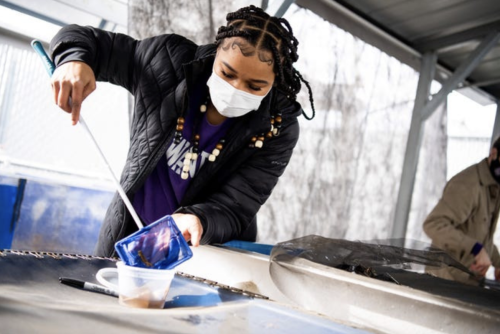
Sewanee's Office of Undergraduate Research and Scholarship (OURS) encourages, supports, and facilitates student research and scholarly experiences. OURS sponsors workshops, research fellowship programs, and forums in which students may present their research, scholarship, and creative pursuits.
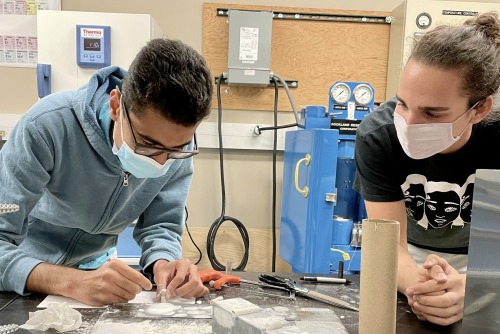
Summer Undergraduate Research Fellowships (SURF) are academic research opportunities hosted by Sewanee faculty specifically for Sewanee students on campus in the summer. The term “research fellowship” is understood to apply to all research or creative activity in all modes of inquiry in the sciences, arts, humanities, and social sciences to clearly distinguish between academic research-oriented experiences mentored by Sewanee faculty and more general career-related experiences, or internships. The Office of Undergraduate Research and Scholarship (OURS) works with the Career Center to offer unique opportunities each summer. Listings of all SURF positions may be found on Handshake. Applications are due on March 1.
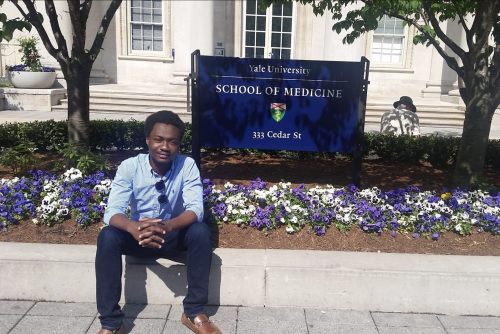
Each year, the Yale Child Study Center (YCSC) in partnership with the Department of Pediatrics offers an 8-week summer internship for rising junior and senior undergraduate students. This research-intensive internship embeds students in projects ranging from basic and applied science to community-based research projects to clinical settings, and incorporating methods including analysis of archived data sets, wet lab techniques, and clinical observations.